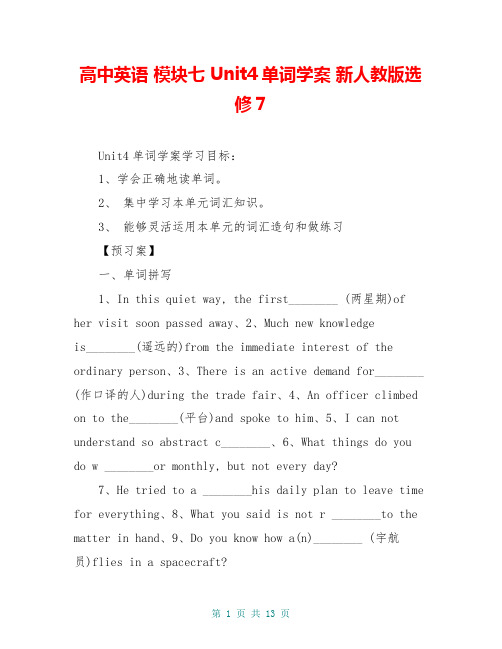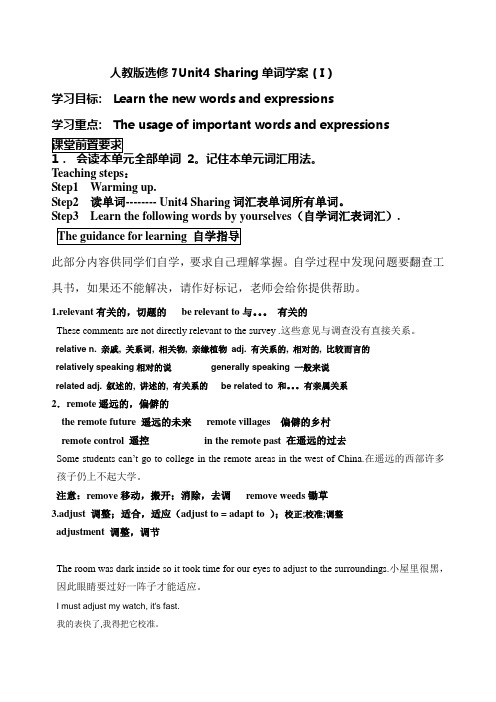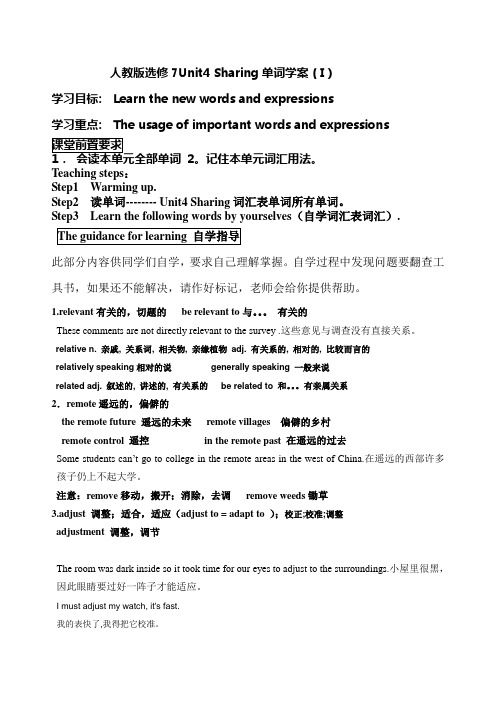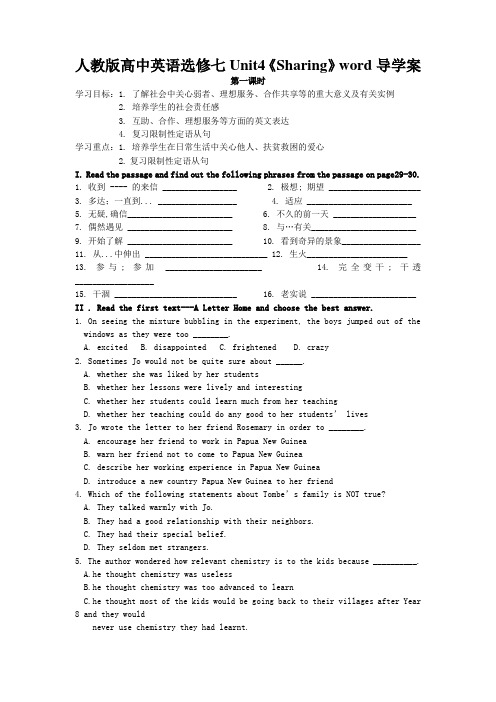高中英语人教新课标选修7unit4导学案1单词
- 格式:doc
- 大小:88.00 KB
- 文档页数:2

高中英语模块七 Unit4单词学案新人教版选修7Unit4单词学案学习目标:1、学会正确地读单词。
2、集中学习本单元词汇知识。
3、能够灵活运用本单元的词汇造句和做练习【预习案】一、单词拼写1、In this quiet way, the first________ (两星期)of her visit soon passed away、2、Much new knowledgeis________(遥远的)from the immediate interest of the ordinary person、3、There is an active demand for________ (作口译的人)during the trade fair、4、An officer climbed on to the________(平台)and spoke to him、5、I can not understand so abstract c________、6、What things do you do w ________or monthly, but not every day?7、He tried to a ________his daily plan to leave time for everything、8、What you said is not r ________to the matter in hand、9、Do you know how a(n)________ (宇航员)flies in a spacecraft?10、The rising sun is especially beautiful to look at from this________(角度)、11、Mother gave me some money for _________ (购买)school books、12、It was a ______ (殊荣)to make hisacquaintance、13、 Tokyo and New York are the major _________ (金融)centers、14、Everyone was asked to ________ (捐赠)a day’s pay to the Children’s Hospital、15、These are _______ (政治)rather than social matters、16、He will work at a private ________ (小诊所)、17、A_________ (目录)tells us the names of all the books in the library、18、We must make __________ (安排,筹备)for the wedding、19、For the reason of_______ (安全),we have to checkit carefully、20、We are to hold a party to celebrate the80th__________ (周年纪念)of our school、二、短语填空用下面方框中的短语的正确形式填空come across stick out hear from dying todry out dry up in need adapt toup to for sure1、I am ____________ get that job、2、 The stream__________ during the hot summer、3、He’s glad to help people _________、4、 The paper were ___________ of his pocket、5、 When they did not _________ her, they feared the worst、6、 He can earn _______ ¥500,000 a year、7、 My lips and mouth keep ___________、8、 When we moved to France, the children __________the change very quickly、9、 One thing was ________ , there was nothing wrong with your eyesight、10、 When you ______ a new word in this passage, don’t turn to the dictionary at once、【探究案】一、检查反馈,导入新课。

人教版选修7Unit4 Sharing单词学案(I)学习目标: Learn the new words and expressions学习重点: The usage of important words and expressions课堂前置要求1.会读本单元全部单词 2。
记住本单元词汇用法。
Teaching steps:Step1 Warming up.Step2 读单词-------- Unit4 Sharing词汇表单词所有单词。
Step3 Learn the following words by yourselves(自学词汇表词汇).The guidance for learning 自学指导此部分内容供同学们自学,要求自己理解掌握。
自学过程中发现问题要翻查工具书,如果还不能解决,请作好标记,老师会给你提供帮助。
1.relevant有关的,切题的be relevant to与。
有关的These comments are not directly relevant to the survey .这些意见与调查没有直接关系。
relative n. 亲戚, 关系词, 相关物, 亲缘植物adj. 有关系的, 相对的, 比较而言的relatively speaking相对的说generally speaking 一般来说related adj. 叙述的, 讲述的, 有关系的be related to 和。
有亲属关系2.remote遥远的,偏僻的the remote future 遥远的未来remote villages 偏僻的乡村remote control 遥控in the remote past 在遥远的过去Some students can’t go to college in the remote areas in the west of China.在遥远的西部许多孩子仍上不起大学。
注意:remove移动,搬开;消除,去调remove weeds锄草3.adjust 调整;适合,适应(adjust to = adapt to );校正;校准;调整adjustment 调整,调节The room was dark inside so it took time for our eyes to adjust to the surroundings.小屋里很黑,因此眼睛要过好一阵子才能适应。

选修7 Unit 4 Sharing第一课时:重点单词1.relevant adj.有关的;切题的irrelevant adj.无关的relevance n.关联;相关性be relevant to=have relevance to=have something to do with...=be related to... 与...有关be irrelevant to=have no relevance to=have nothing to do with...与...无关In the exams, make sure that everything you write is relevant to the questions you have been asked.在考试时一定要注意,你写的所有内容都要切合题意。
2.adjust v. 调整;(使)适合n. adjustment调整;适应adj. adjustable 可调整的adjust sth.to sth.调整……以适应……adjust oneself to doing..adjust to doing...适应做……make an adjustment to sth.对……作出调整1)These desks and chairs can be adjusted to t he height of any child 这些桌子和凳子能被调整到适合任何孩子的高度。
2) The quicker you adjust yourself to living the college life, the more progress you will make.你越快适应过大学生活,取得的进步就会越大。
3. participate vi.参与;参加participation n.参加;参与participant n.参加者;参与者participate with sb.in sth.同某人参与某事participate in=take part in参加……take an active part in积极参加1)Everyone in the class is expected to participate in these discussions. 希望全班同学都能参与这些讨论。

人教版选修7Unit4 Sharing单词学案(I)学习目标: Learn the new words and expressions学习重点: The usage of important words and expressions2。
记住本单元词汇用法。
Teaching steps:Step1 Warming up.Step2 读单词-------- Unit4 Sharing词汇表单词所有单词。
Step3 Learn the following words by yourselves(自学词汇表词汇).此部分内容供同学们自学,要求自己理解掌握。
自学过程中发现问题要翻查工具书,如果还不能解决,请作好标记,老师会给你提供帮助。
1.relevant有关的,切题的be relevant to与。
有关的These comments are not directly relevant to the survey .这些意见与调查没有直接关系。
relative n. 亲戚, 关系词, 相关物, 亲缘植物adj. 有关系的, 相对的, 比较而言的relatively speaking相对的说generally speaking 一般来说related adj. 叙述的, 讲述的, 有关系的be related to 和。
有亲属关系2.remote遥远的,偏僻的the remote future 遥远的未来remote villages 偏僻的乡村remote control 遥控in the remote past 在遥远的过去Some students can’t go to college in the remote areas in the west of China.在遥远的西部许多孩子仍上不起大学。
注意:remove移动,搬开;消除,去调remove weeds锄草3.adjust 调整;适合,适应(adjust to = adapt to );校正;校准;调整adjustment 调整,调节The room was dark inside so it took time for our eyes to adjust to the surroundings.小屋里很黑,因此眼睛要过好一阵子才能适应。

人教版高中英语选修七Unit4《Sharing》word导学案第一课时学习目标:1. 了解社会中关心弱者、理想服务、合作共享等的重大意义及有关实例2. 培养学生的社会责任感3. 互助、合作、理想服务等方面的英文表达4. 复习限制性定语从句学习重点:1. 培养学生在日常生活中关心他人、扶贫救困的爱心2.复习限制性定语从句I. Read the passage and find out the following phrases from the passage on page29-30.1. 收到 ---- 的来信 _________________2. 极想; 期望 _____________________3. 多达;一直到... __________________4. 适应 ________________________5. 无疑,确信________________________6. 不久的前一天 ___________________7. 偶然遇见 ________________________8. 与…有关________________________9. 开始了解 ________________________ 10. 看到奇异的景象__________________ 11. 从...中伸出 ____________________________ 12. 生火_______________________ 13. 参与; 参加______________________ 14. 完全变干; 干透__________________15. 干涸 ____________________________ 16. 老实说 ________________________ II . Read the first text---A Letter Home and choose the best answer.1. On seeing the mixture bubbling in the experiment, the boys jumped out of the windows as they were too ________.A. excitedB. disappointedC. frightenedD. crazy2. Sometimes Jo would not be quite sure about ______.A. whether she was liked by her studentsB. whether her lessons were lively and interestingC. whether her students could learn much from her teachingD. whether her teaching could do any good to her students’ lives3. Jo wrote the letter to her friend Rosemary in order to ________.A. encourage her friend to work in Papua New GuineaB. warn her friend not to come to Papua New GuineaC. describe her working experience in Papua New GuineaD. introduce a new country Papua New Guinea to her friend4. Which of the following statements about Tombe’s family is NOT true?A. They talked warmly with Jo.B. They had a good relationship with their neighbors.C. They had their special belief.D. They seldom met strangers.5. The author wondered how relevant chemistry is to the kids because __________.A.he thought chemistry was uselessB.he thought chemistry was too advanced to learnC.he thought most of the kids would be going back to their villages after Year8 and they wouldnever use chemistry they had learnt.D.he thought chemistry could make difference to the kids’ lives6. Why did Tombe throw out the tin can?A.Because he believed the can attracted evil spirits.B.Because he believed any leftovers attracted evil spirits.C.Because he believed the can had no use at all.D.Because he believed the grill attracted evil spiritsIII. Fill in the blanks to summarize the passage:Thanks for your letter. It was wonderful to ______ from you. I know you’re ______ to hear all about my life in PNG, so I’ve _______ some photos which will help you picture the places I talk about. The classrooms are made _______ bamboo and the _______ of grass. It takes boys ______ ______ two hours to get to school.Students have no _______ of doing experiments and there is no equipment. Sometimes,I wonder how _______ chemistry is to these students, most of _______ will be goingback to their villages after Year 8 anyway. To be honest, I doubt whether I’m making any ________ to these boys’ lives at all.Another teacher , Jenny, and I did _______ a village which is the home of one of the boys, Tombe. It was my first visit to a ________ village. Tombe’s father, Mukap, led us to his house, a low bamboo hut with grass ________ out of the roof.The hut was dark inside so it took time four our eyes to _______. I loved listening to the family softly _______ to each other in their language, even though I could not ________ in the conversation. We left the village the next morning . It was sucha ______ to have spent a day with Tombe’s family.IV. Analyze these sentences of the first text and translate them into Chinese.1. We walked for two and a half hours to get there--- first up a mountain to a ridgefrom where we had fantastic views and then down a steep path to the valley below.2. The other day (_________)I ______ _______ (正在做演示)the boys the weeklychemistry experiment _______(这时), before I knew it, the mixture was bubbling over everywhere!3. Sometimes I wonder _____ _______ ________ ____ ____ (化学对这些小孩怎么说有多大的用处)these students, ________ _____ _______(他们中的大多数人)will be going back to their villagesafter Year 8 anyway.4.____ _____ _______(说实在的), I doubt _______ ____ ________ _____ _____ ______these boys’ lives at all(我确实不明白我教的课是否会让这些小孩的生活有所改变).Book7 Unit4 Sharing 导学案第二课时1. 课本原句:I know ______ ________ _____ hear all about my life here, so I’veincluded some photos which will help you picture the places I talk about. 我明白你急于了解我在这儿的生活情形,因此我在信中附有几张照片,会关心你想象出我所谈到的地点。

Book 7 Unit 4 Sharing 导学案Task I. Skimming1.Divide the passage into 4 parts and match the main idea of each paragraph.Part 1(Para. 1) End of the letter.Part 2(Para. 2-3) Opening of the letter and introduction to what will be talked about in the passage. Part 3(Para. 4-8) The school where Jo worked and Jo's work at school.Part 4(Para. 9) Jo and Jenny visited Tombe's home in the village.2. Fill in the blanks with the names mentioned in the text.1. ________ is a young Australian women.2. _________ was dying to hear all about Jo's life in Papua New Guinea.3. _________ walked a long way to get to the school.4. didn't have any textbooks.5. ______________ became a lot more imaginative when teaching.6. _________ started jumping out the windows during a chemistry experiment.7. ____________ visited a village that was the home of one of the boys, Tombe.8. __________ started crying "ieee ieee"to welcome them.9. __________ led us to a low bamboo hut.10. __________ was going to share the platform with Jenny and Jo.11. _____________ softly talked to each other in their language Jo didn't understand.Task II. Detailed readingRead the passage carefully and answer the questions based on each part.Part 1(Para. 1) Why did Jo send Rosemary some photos?Part 2 (Para. 2-3)1: Why does Jo call the high school a “bush school”2: Were the boys friendly to Jo? How do you know?3: How long does it take the students to go to school?4: Why was science the most challenging subject for Jo?5: Can you find some other facts about the poor teaching conditions?6. How did Jo deal with the poor teaching conditions?Part 3(Para. 4-8)1.Why should it take Jo and Jenny two and a half hours to get to the village?1. Science is the most difficult subject as the students know a little about doing experiments.2. In Tombe’s village, all people a re the relatives of his family.3. As it is very remote, it took two weeks to arrive in PNG .4. Since I arrived, I have been always self-confident.5. Tombe’s families were so friendly that they laid fresh grass on the floor for me.6. Before my volunteer career, I learnt a lot about the local custom and natives.7. Even it is poor and less developt, I suited the local condition soon after my arrival.8.Many of the boys have to walk a long way to school and I usually walked up to two hours.9. Boys jumped out of the windows as they were scared.10. Now I knew local people quite well after I visited Tombe’s family.11. I visited Tombe’s family alone.12. The villagers’ huts are similar to school classrooms except that they were small and darkinside.Task IV. Summary1. How did the writer’s feelings and attitudes change when she worked in local school?2. Why does the writer consider it as a privilege to visit Tombe’s family?3. Do you think the passage is well-organized? if you try to writer the passage, what will be your structure like?。
Book 7 unit 4 Sharing导学案Period 1 Warming Up & Reading—Preparing【学习目标】1.认知单词并熟记2.快速浏览课文,了解文章大意3.精读课文,明确作为一名新闻记者所要具备的品质,水平,以及报道新闻时的注意事项►Step One:Words and Phrases【学法指导】1.先用蓝笔或黑笔自己检测,凭自己记忆,全力写出会的单词或短语,以此来检测自己词汇掌握如何。
2.再结合课本单词表或工具书用红笔改出自己写错的或没有写的,当然能够结合老师给出的答案实行进一步纠错。
3.全力以赴,疯狂背诵自己不会的及错的!英语要学好,词组短语不得少!Ⅰ.词汇知识A)将单词与对应的英文解释连线(A级)1.remote A.an idea or a principle that is connected with sth.2.concept B.far away from places where other people live3.privilege C.a person whose job is to translate what sb.is saying into another language 4.interpreter D.used to state what the result would be if sth.did not happen or if the situation were different5.otherwise E.a special right or advantage that a particular person or group of people hasB)英汉互译(A级)6.________ (adj.) 泥泞的;泥土般的7.___________ (vi.) 参与;参加8.________ (adj.) 相关的;切题的9.__________ (n.) 矩形;长方形10.________ (vi. & vt.) 调整;(使)适合11.________ (n.) 杂草;野草(vi.& vt.) 除杂草12._____________ (n.) 安排;排列13.fortnight (n.) ________14.sniff (vt.& vi.) __________________15.paperwork(n.) _____________Ⅱ.重点短语(A级)1.hear _______ 接到……的信2.(be) dying _______ 极想;渴望3.be made _______ 由……制成4.the _______ day 不久前的一天5.come _______ 偶然遇到6.shake hands _______ sb. 与某人握手7.dry _______ (使浸水等之物)完全变干;干透8.dry _______ (指河流、井等)干涸►Step Two:Fast Reading(A级)Scan the text and then choose the best answer according to the text.1.The boys jumped out of the windows when doing the chemistry experiment because they________.A.didn’t like doing chemistry experimentsB.were frightened by the bubbling mixtureC.wanted to ask someone else for helpD.couldn’t stand the terrible smell of the mixture2.Why does Jo wonder how relevant chemistry is to the kids? _______A.Because she thinks chemistry is too difficult to learn.B.Because she thinks chemistry may make little difference to the kids’ life.C.Because the kids there hardly come across anything of chemistry.D.Because she thinks chemistry useless.3.Which of the descriptions is NOT right about Tombe’s house? _______A.It was a low bamboo hut with grass sticking out of the roof.B.It was dark and there was a fireplace in the centre of it.C.It was roundshaped with small windows and a narrow doorway.D.There were only a few possessions in it.4.From the passage,we can infer that “ieee ieee” is mostly________.A.a sign of asking for helpB.a greeting just like “hello” or “welcome”C.a sign of fearD.a sentence just like “Who are you?”5.What’s the main idea of the letter? _______A. Jo told Rosemary what she had done and seen in Papua New Guinea.B.Jo advised us to come to Papua New Guinea.C.Jo encouraged her friend to live in Papua New Guinea.D.Jo introduced the local people’s battle against their enemy.►Step Three:Careful ReadingⅠ.Read the text and then answer the following questions.1.Why did Jo send Rosemary some photos?答案:____________________________________________________________________________________________________________ 2.Why does Jo call the high school a “bush school”?答案:______________________________________________________________________3.Why was science the most challenging subject for Jo?答案:____________________________________________________________________________________________________________ 4.How long does it take the students to go to school?答案:____________________________Ⅱ.Read the text quickly and complete the main idea of it.(A级)The text is a letter written by a young volunteer who teaches in a(n) 1.______school in PNG.She writes about her experiences as a teacher and her 2._____ to a student’s village. Ⅲ.Read the text carefully and then match the main idea of each part.Part 1 (Paragraph 1):A.Jo and Jenny visited Tombe’s home in the village.Part 2 (Paragraphs 2~3):B.Closing of the letter.Part 3 (Paragraphs 4~8):C.The school where Jo worked and Jo’s work at school.Part 4 (Paragraph 9):D.Opening of the letter and introduction to what will be talked about in the passage.►Step three:Consolidation(C级)In the letter that Jo wrote to Rosemary,she told of her experiences of being a teacher in a 1. _______ school in Africa.We can imagine how difficult it was for her to work there,since there was no 2. __________or 3. _________,and no 4. ___________for science subjects.And students had to walk 5. __________to the school.It was difficult for her to 6. __________ the localpeople as she didn’t know much Pidgin English,but there was one chance that she managed to visit the home of one of her students.After as long as 7. ___________________hard journey,she and another teacher Jenny arrived at Tombe’s house,a low 8. __________hut with grass 9. ___________of the roof.They entered the room through the narrow 10. __________,and the hut was dark inside so it took time for their eyes to 11. __________.At dinner,Jo and Jenny learned a lot of local traditional customs.Jo really felt it was a great 12. __________to have spent a day with Tombe’s family.►Step Four:Discussion(B级)Would you like work as a volunteer in a poor area? Why?_______________________________________________________________________________ _______________________________________________________________________________ _______________________________________________________________________________ _______________________________________________________________________________【学习反思】预习中我还有哪些不明白的地方?我该怎样去解决?__________________________________________________________________________ Section ⅡWarming Up & Reading-Language Points【学习目标】学习并灵活使用本单元重点词汇和句型。
导学案(B7U4)预习案一、熟读短文Helping the Remote Village援助山村A year ago, the famous astronaut received an invitation by airmail from a remote village. Intending to sniff some fresh air, he and his interpreter paid a fortnight visit there. It was a privilege for them to be there, but they were shocked by what they saw. The tracks were muddy. The river was dry ing up. Most villagers only possessed one broom, a few tin s and several jar s and their rectangular grass huts with round angle s were surrounded by weed s. Besides, their school had no roof and platform, and the students had no concept of click ing a computer at all. They were badly in need.Soon, the astronaut made a generous voluntary donation to the village. There were textbook s for students, sewing machine s for tailor s and tractor s for farmers. His distribution catalogue also included operating a clinic and a trunk library, as well as giving weekly lessons to teach relevant farming knowledge like how to dry out seed s or raise ox en. He himself not only helped do some paperwork but also purchase d grill s for boys to toast potatoes and comb s for girls who were dying to get one. The other day, he heard from the villagers again inviting him to participate in the donation anniversary. For political and security reasons, he couldn’t adjust his outgoing arrangement-otherwise he would go. But his deeds were remembered forever.一年前,那位著名的宇航员收到一份由一个偏远村庄通过航空邮件寄来的邀请。
Book7 Unit4 SharingPeriod 1: New words and expressions制作:审核:高二英语备课组学习目标:1、学会正确认读本单元词汇.2、掌握重要词汇的搭配和用法: (be) dying to; relevant; adjust; donate;distribute; dry out; dry up3、学会在具体语境中准确、恰当运用所学词汇。
重点&难点:学会在具体语境中准确、恰当运用所学词汇。
B e f o r e c l a s s课前预习案:(自主学习区)使用说明&学法指导:1、在预习时,先拼读本单元的词汇,对于拼读不确定及不会读的单词可在组内解决或在早读时间解决。
2、完成时间:20分钟。
Fill in the blanks according to the textbook.Ⅰ.Key words.1.___________n.两星期2.___________adj. 泥泞的;泥土般的→___________ n.泥;泥浆3.___________ adj.& adv.每周(的)→_____________ n.周;星期4.___________ adj.遥远的;偏僻的→___________(同义词)5.___________ vi.& vt. 调整;(使)适合→_____________ n. 调整6.___________ conj.否则;不然adv.用别的办法;其它方面7.___________ n. 特别;特别优待8.___________ n.安排;排列→_______________ v.安排;排列9.___________ n. 宇航员;太空人→___________ n.天文学家10.___________ n.角;角度→______________ n.天使11.___________ vt.捐赠→___________ n.捐献;捐赠→_____________n. 捐赠者12.___________ adj.自愿的;志愿的;无偿的→______________n.志愿者v.自愿(做)13.___________ vt.& n.买;购买→_____________(同义词)14.___________ adj.政治的;政党的→___________ n.政治15.____________vt.分配;分发→________________ n. 分配;分发;分布状态16.____________ n.安全;保护;保障→________________ adj. 安全的;放心的17.____________vi.工作;运转vt.操作→____________n. 操作;手术→____________n.操作员;经营者Ⅱ.key phrases.1._______接到……的信2. ___________极想;渴望3. the other day ____________4. dry out ________________5.dry up6.in need Ⅲ. Sum up.(找出上面词汇的前缀或后缀)_______________________________________________________________________ Ⅳ.My confusion: (写出你在预习中遇到的困惑)___________W h i l e c l a s s课堂探究案使用说明&学法指导:1、按照设计的探究点先自主学习再以小组为单位进行合作探究学习,完成学习任务。
2、各小组对学习成果进行展示;教师点拨、点评反馈。
T a s k1【检查回顾】C l o s e y o u r b o o k s.R e a d t h e f o l l o w i n g w o r d s c o r r e c t l y a n d t r a n s l a t e t h e m i n t o C h i n e s e.fortnight weekly relevant remote adjust participateotherwise donate voluntary purchase sew distributeT a s k2【合作探究】Learning tip(小提示):1、结合语境理解词汇的含义并牢记主要用法。
2、先独立完成,再小组合作学习,统一答案,小组展示。
1、【课文原句】I know you are dying to hear all about my life here, so... (P29)1)Translation:__________________________________________________________2)【语境助记】①All of them are dying to see the movie.②He is dying to know the result of the exam.③I am dying for a glass of water.【归纳用法】3)【针对训练】①Many of us are to know what the theme of new project is.A. agreeingB. dyingC. wantingD. desiring②我极想出国___________________ _③他很渴望喝点酒________________________ _4)【联想拓展】“渴望”的类似说法①be eager to do sth./for sth. ②be anxious to do sth./ for sth.③desire to do sth./for sth ④long to do sth. / for sth.2、【课文原句】Sometimes I wonder how relevant chemistry is to these student, most of whom… (P29)1)Translation:________________________________________________________2)在本句中,relevant意为3)【语境助记】观察例句,总结relevant用法:①What you said is not relevant to this matter .②Her statement is really relevant to this case.be relevant to = be connected with/ have sth. to do with4)【针对训练】①His nationality ____________________ whether he is a good teacher.他的国籍与他是否是位好老师无关。
②What experience do you have that is ____________________ this position?你有什么跟这个工作相关的经历?3. The hut was dark inside so it took time for our eyes to adjust. (P30)1)Translation:________________________________________________________2)在本句中,adjust 意为3)【语境助记】观察例句,总结adjust的用法:①It took her a while to adjust to living alone.②You will quickly adjust yourself to student life.③Just as I tried to make the necessary adjustment to this new situation,Wang Pingappeared.4①我的表快了,我得把它校准。
My watch is too fast. I have to __________ it.②一个人很难使自己适应他人的习惯。
It is difficult for someone to _____________others' habits.③她花了很长时间才适应了在美国独自生活。
It took her a long time to__________________ alone in America.④动物能使自己适应生存环境。
Animals can __________________ the environment.4. Tombe told me that the can was heated to dry out the leftover food. (P30)…so the food is dried up in the can and the can is thrown out of the hut. (P30)1)Translation: _______________________________________________________2)在句子中,dry out意为 ; dry up意为3)【短语辨析】dry out (使)变干; 干透①他告诉我加热罐子是为了使剩余的食物变干。
He told me that the can was heated to_______________________②Water the plant regularly, never letting ______________ . (土壤干枯) dry up (河流,湖泊等)干枯; 弄干、晒干、变干; (供应、思路) 枯竭①During the drought, the river dried up.②太阳很快就会把马路晒干的。
_______________________________T a s k3【词汇运用】village school in the west part of China as a voluntary teacher. The condition there is very bad. The way to his school is 4._____ and the classroom is very old. Still worse, the students have not enough 5.______ . At the beginning, he couldn`t stand it, but now he has already 6._____ to it. Much to his satisfaction, the students 7.______ learn much knowledge to build and develop their hometown. He says he is very busy now. Every day he does much 8.______ and makes 9. _____ for the next day. 10. ___ _ he would have written to me earlier. However, he feels very full and happy.Li Ping also advises me to join a 11._____ organization to 12. ____ in various activities to help those 13. ____ . He says I can14.__ _ books or money to the poor children. He will15. ___ __these things to them.T a s k4【当堂检测】Translate the following sentences into English.1. 我昨天收到了纽约的姐姐的来信。